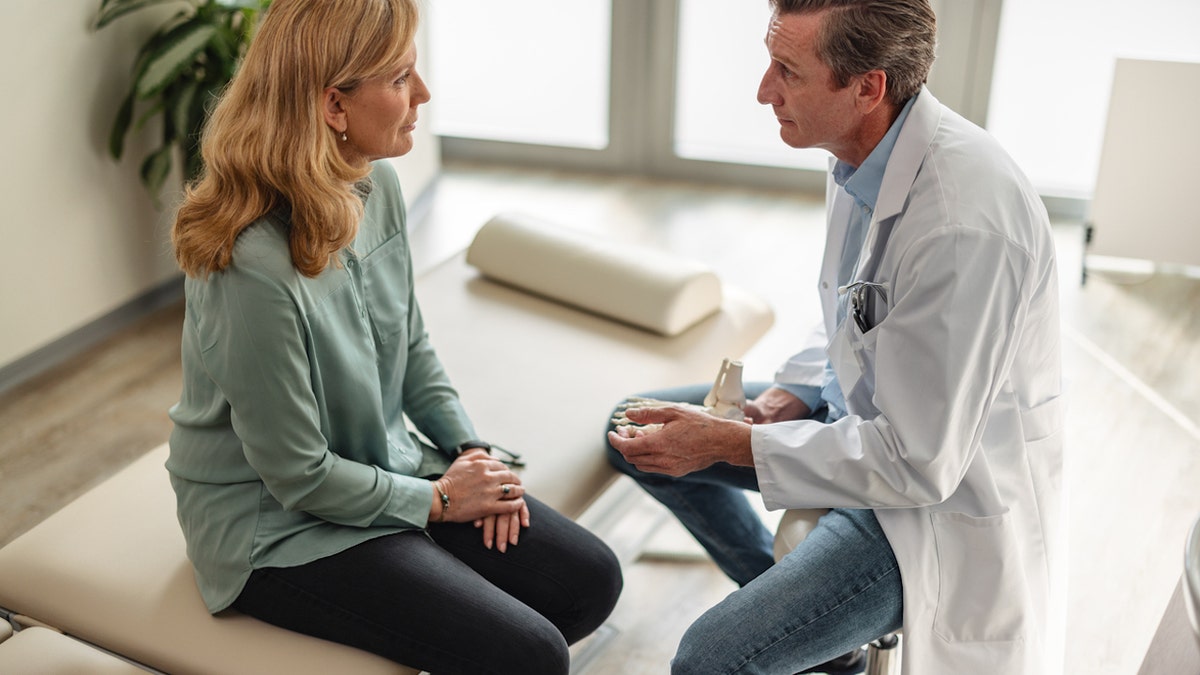NEWYou can now listen to Fox News articles!
Recent studies have shown that even if you feel healthy and fit, your immune system could be aging quicker than you think, which could increase the risk of infections and immune-related disorders.
“Immune aging, like all aging, means that our immune systems start to slow down, make more mistakes and be less effective at protecting us from infection as we get older,” Chris Rhodes, Ph.D., a nutritional biochemist and longevity expert in California, told Fox News Digital.
When the immune system ages, immune cells become less able to perform crucial functions like fighting infection, destroying cancer cells and healing wounds, according to Rhodes, who is also the CEO and co-founder of Mimio Health in San Francisco.
SCIENTISTS UNCOVER HOW SOME 80-YEAR-OLDS HAVE THE MEMORY OF 50-YEAR-OLDS
“After the age of 35, our immune systems become less and less able to adapt to new antigens, allergens and other inflammatory stimuli — and our thymus, the organ responsible for producing T-cells, gradually shrinks, meaning our immunity and ability to respond to new infections becomes more compromised with age,” the doctor added.
Inflammation is a key driver of declining immune function, leading to what many experts call “inflammaging.”
“Low-grade inflammation accelerates many age-related diseases, from cardiovascular disease to neurodegeneration,” Dr. Pooja Gidwani, a double board-certified doctor of internal medicine and obesity medicine in Los Angeles, told Fox News Digital.
Signs of an aging immune system
Some signs that the immune system is slowing down include increased infections or colds, slower wound healing and diminished recovery from exercise or injury, according to Rhodes.
Fatigue, joint stiffness, aches and pains, recurrent viral flare-ups and a weaker vaccine response could also indicate a declining immune system.
5 ways to slow down immune aging
While most people begin to experience “measurable immune decline” by their late 30s to early 40s, making certain lifestyle changes and boosting metabolic health can significantly delay it, according to Gidwani.
“A youthful immune system isn’t about never getting sick — it’s about recovering quickly, regulating inflammation effectively, and preserving the energy and cognitive clarity that define long-term vitality,” she said.
7 STEPS TO ‘SUPER-AGING’ ARE KEY TO LIVING A LONGER, MORE FULFILLING LIFE, EXPERTS SAY
The experts shared the below strategies for slowing down immune system aging.
No. 1: Optimize nutrition diversity
Gidwani emphasizes the importance of nutrient diversity, not just healthy eating. She recommends incorporating a variety of plants, proteins and healthy fats daily.
“A wide variety of polyphenols, fibers and omega-3 fats nourishes the gut microbiome, which trains and regulates immune cells,” she said. “Because roughly 70% of immune tissue resides in the gut, microbial diversity directly predicts immune resilience.”

Diet plays an “enormous role” in immune functionality and longevity, according to Rhodes, as the effects of certain foods can boost inflammation and lead to immune system stress. Over time, this can promote autoimmune disorders, contribute to disease progression and decrease longevity.
“The best way to keep your immune system youthful and happy is to focus on a diet rich in antioxidants, polyphenols and plant bioactives that have anti-inflammatory effects, as well as whole foods that avoid the glucose and lipid spikes that promote inflammation,” he advised.
Diet plays an “enormous role” in immune functionality and longevity.
Rhodes also recommends considering intermittent fasting to minimize the time the body spends in the “post-prandial (post-eating) state” and to benefit from “powerful anti-inflammatory effects.”
No. 2: Protect sleep and manage stress
Lack of sleep and chronic stress can cause immune cells to be more worn out, less effective at their jobs and more prone to making mistakes, according to Rhodes.
“Increases in cortisol caused by lack of sleep or high stress levels will promote immune system activation, which can be beneficial in the short term to avoid infection, but will lead to accelerated immune cell aging and less effective functionality over time,” he warned.

“Ultimately, chronic activation of the immune system due to lack of sleep and high stress will burn out your immune cells faster and accelerate their aging.”
Sleep is the ultimate “immune modulator,” Gidwani said, as even one night of deprivation can cut “natural-killer-cell activity” by up to 70%.
CLICK HERE FOR MORE HEALTH STORIES
She recommends getting seven to eight hours of quality sleep nightly and cultivating a stable circadian rhythm.
Finding “intentional” ways to manage stress — such as journaling, meditating and spending time outdoors — can also help boost immunity.
No. 3: Get regular exercise
Exercise is known to strengthen immunity by lowering stress hormones, reducing chronic inflammation and helping immune cells move through the body.
Rhodes cautioned, however, that while exercise is essential to promoting long-term health and longevity, it can also be “pro-inflammatory,” as the damage done to the muscle during exercise also activates the immune system and causes inflammation.
“High-impact and intense-burst exercise like sprinting, HIIT training or heavy weight lifting will be the most inflammatory, as these typically cause the highest level of acute muscle and joint stress and promote cellular growth pathways associated with aging,” he said.

Low-impact endurance exercise, like marathon running, hiking, swimming or biking, will typically cause less inflammation over time, helping to keep the immune system “functional and fresh” in the long term, Rhodes advised.
Gidwani recommends striving for a blend of aerobic (cardio) exercise and strength training to optimize mitochondrial health.
CLICK HERE TO SIGN UP FOR OUR HEALTH NEWSLETTER
“Consistent, moderate exercise enhances mitochondrial function and lymphatic flow, improving immune surveillance without promoting inflammation,” she said.
No. 4: Consider supplements (carefully)
Some supplements and newer interventions can help slow down immune aging, according to Gidwani.
“Core nutrients like vitamin D, magnesium, zinc and omega-3s remain foundational,” she said. “Beyond that, NAD⁺ boosters, senolytic compounds and select peptides — such as thymosin alpha-1 for immune modulation and BPC-157 for tissue repair — are promising adjuncts for supporting repair and lowering chronic inflammation.”
“Most people begin to experience measurable immune decline by their late 30s to early 40s, but lifestyle and metabolic health can delay it significantly.”
The doctor noted, however, that these supplements should complement, not replace, healthy lifestyle behaviors.
Rhodes suggested that while some vitamins and supplements are critical to immune function, the importance of these “has often been overhyped.”
TEST YOURSELF WITH OUR LATEST LIFESTYLE QUIZ
“While the immune system needs essential vitamins, minerals, proteins and fatty acids to function properly, taking high doses of these micronutrients will typically not add any additional benefit beyond avoiding deficiencies,” he said.
Some of the best supplements to take are those with anti-inflammatory effects, Rhodes said.
CLICK HERE FOR MORE HEALTH STORIES
“These can be compounds like EGCG from green tea, omega-3 fatty acids, anthocyanins from berries, and biomimetics like palmitoylethanolamide (PEA) and oleoylethanolamide (OEA) that recreate the body’s natural anti-inflammatory signaling.”
People should speak with a doctor before starting a new vitamin or supplement regimen.
No. 5: Foster connection
Research has shown that oxytocin, known as the “bonding” hormone, plays a role in regulating stress responses and inflammation, which can boost immune function.
“Physical touch, laughter and community raise oxytocin, lowering cortisol and systemic inflammation,” Gidwani said.
Read the full article here










